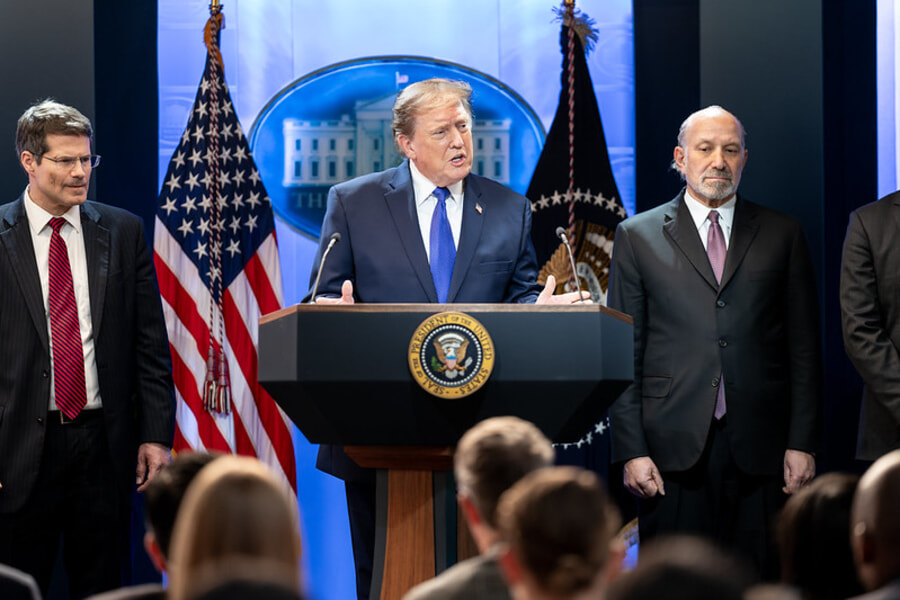The Uncertainty of the Black Sea Grain Agreement: A Counterresponse
.jpeg?sfvrsn=ffc09566_3)
In his recent response to my piece on Lawfare about the Black Sea Grain Initiative (BSGI and also referred to as the Grain Deal), Gregory Novak—with the support and endorsement of Helmut Aust—laid out thought-provoking and useful observations related to our debate on the legal nature of the initiative.
The Point of Disagreement: Clear-Cut Treaty vs Ambiguity
In their initial piece on Just Security, Novak and Aust confidently concluded that “the BSGI was indeed a treaty” (emphasis added). However, in his recent reply to my piece, Novak seems to soften the stance a bit by, for example, mentioning the agreement’s “likely legal nature,” “the uncertainty surrounding the BSGI’s legal status,” and that I am “right to recall the continued uncertainty on that issue” (emphasis added).
In my Lawfare piece, I highlighted the uncertainty of the initiative’s nature, arguing that “the agreement’s text is, at best, ambiguous on the matter” and that there are “reasonable grounds to claim its political nature.” I did not claim, however, that there are no plausible arguments in favor of its legal bindingness. I also did not opine on which position is stronger, purposefully avoiding the wording “most likely” and acknowledging that the deal constitutes one of the hard cases of differentiating between politically and legally binding agreements.
In short, I claim that the Grain Deal is ambiguous in nature (likely by design, in a similar way to the Budapest Memorandum—which I described in an earlier Lawfare piece), and there is a reasonable case for its political nature. Novak and Aust, in contrast, argued that the agreement is indeed a treaty.
Factors Up for Debate
Terminology
In their initial piece, Novak and Aust heavily relied on wording used in the Grain deal that would typically be used to denote a treaty. This includes the words such as “Parties,” “shall,” and “(t)he Parties agree as follows.” They also mentioned that per “the ICJ’s case law, the ‘actual terms’ of the instrument are more relevant.” Further, three of the six observations mentioned in their piece related to this wording, while the other three were framed as indeterminative observations (the title “initiative,” the agreement’s connection to the SOLAS framework, which “does not require the legal nature of agreements” and nontraditional framing of text for a treaty). After these six observations, they concluded that “the above arguments point to the legal bindingness of the BSGI.”
Novak and Aust’s argument is “based primarily on this specific [treaty-like] wording.” I disagree with their position. The agreement’s text is ambiguous and contradictory—largely due to the use of the relatively soft verb “will” in respect to security commitments—as well as traditionally non-mandatory vernacular such as “will remain in effect” instead of Vienna Convention on the Law of Treaties-like phrases such as “enters into force.” After reading Novak’s clarification, my understanding is that he and Aust agree that the above mentioned treaty-like language are not “magic words [that necessarily] convert a text into a treaty” (borrowing a useful metaphor from Duncan Hollis) and, on their own, do not necessarily mean that the Grain deal is a treaty, especially when other wording in the text is ambiguous or points toward political commitments.
Looking Beyond the Text
In addition to the six observations mentioned above, Novak and Aust mentioned that their argument is “further underlined by comparing the BSGI with the parallel [memorandum of understanding (MoU)] between the UN Secretariat and Russia.” Based on this comparison, they concluded that, “the fact that the issue of legal bindingness is so clearly addressed in the MoU in a negative sense supports the finding that the BSGI is indeed a legally binding treaty in the sense of the law of treaties” (emphasis added). I disagreed with this conclusion in my piece. Although the MoU has a political connection to the Grain Deal, the agreements have different parties and subject matters. Therefore, Novak and Aust’s conclusion is implausible since, as I mentioned, “different configurations of parties can have different reasons for employing different wording [in different agreements], especially with a different subject matter.” This appears to be one of the key points of our respectful difference.
That said, Novak’s reply provides a useful critique of another factor I used in my analysis—the statements issued by Ukraine and Russia following the conclusion of the Grain Deal. He notes that “a party’s [Russia’s] post-hoc qualification of an agreement is irrelevant to its legal qualification, especially in a situation in which that party has taken several actions at odds with its commitments under it” (emphasis added). He also opines that Russia often uses the non-binding label “deal” instead of “treaty” in context of referring to the tandem of agreements—the Grain Deal and the MoU between Russia and the U.N. Secretariat—and sometimes uses allegedly binding “vernaculars” such as “a right of withdrawal” or “suspension.”
First, I would like to clarify that I relied on comments from both Ukraine and Russia, not only Russian statements. Namely, I used remarks offered by Ukrainian President Volodymyr Zelenskyy after Russia attacked the Odesa port the day after signing the deal—an act Ukraine considered to be a breach of the initiative. In his comments, Zelenskyy did not accuse Russia of breaching international law—instead referring to the developments as an “attack on Russia’s own political positions.” (emphasis added). Aside from Zelenskyy’s comments, Ukraine generally avoids publicly recognizing that it concluded any agreements with Russia for the perception reasons I describe in more detail in my previous piece.
Second, Russia’s reference to the so-called “package deal” also highlights its non-binding rhetoric. It seems like, in a way, Russia is making a political (but not legal) connection between the Grain Deal and the clearly non-binding MoU, despite the fact that the Grain Deal’s text mentions nothing about the political MoU’s performance. Although the wording “a right of withdrawal” and “suspension of participation” is applied in the law of treaties, it is also used in political agreements: states can withdraw or suspend their participation in them, as well and argue the appropriateness of such actions or a breach of political commitments resulting from them. For example, former U.S. President Donald Trump used this type of wording when he stated that the United States would “withdraw from the Iran nuclear deal” (emphasis added)—which was widely considered as a political, not legal, agreement in the United States.
Third, both Ukraine and Russia’s statements may be indicative (albeit not determinative) of their initial intent to have a political agreement per international practice, especially when the agreement’s text and other factors do not provide much clarity on the matter. They certainly make arguing in favor of the agreement’s legal nature more difficult. For example, in the South China Sea Arbitration, the arbitral tribunal reasoned its finding on a nonbinding agreement based, among other things, on the fact that “before the arbitration commenced … several Chinese officials described the [agreement] as a “political” document” (emphasis added).
The Role of the Law of Treaties and Ambiguity
In my Lawfare piece, I opined that “in light of ambiguity [of the agreement’s nature] and the parties’ unconditional veto over the deal’s extension, the main driver for the continuing operation of the initiative is favorable cost-benefit calculus of the parties” and thus “the law of treaties does not have much relevance on the parties’ loyalty to the deal.” In other words, flexibility embodied in the Grain Deal’s text and reasonable grounds to claim its political nature significantly minimizes any potentially meaningful constraining effect of the law of treaties (direct or indirect), including in terms of framing discussions around the continuation of the agreement’s implementation.
In contrast, Novak and Aust argued in their piece that, “following Russia’s purported suspension of its implementation of the BSGI, the formal legal constraints, coupled with the distinctive design of the “package deal,” may have played a role in helping resolve this temporary crisis” (emphasis added). I understood this as helping (at least indirectly) to get Russia back into the deal’s implementation and christened “loyalty to the deal.” However, in his response, Novak seems to present a more modest position, saying that they only claimed that the law of treaties “provided a conceptual and argumentative framework” and likely “played a significant background role in stabilizing [the initiative]” (emphasis added).
My reservations about the initiative’s ambiguity apply to this more nuanced framing of the argument as well. A “conceptual and argumentative framework,” to which Novak refers, is not a unique feature of the law of treaties. Political agreements can also supply political concepts and arguments which frame their implementation between states. For example, as international law scholar Oscar Schachter discussed in his seminal piece on the matter:
the fact that the states have entered into mutual engagements confers an entitlement on each party to make representations to the others on the execution of those engagements … When other parties make representations or offer criticism about conduct at variance with the undertaking in the agreement, the idea of a commitment is reinforced, even if it is labeled as political or moral.
Based on Schachter’s description—despite their clarifications—it is unclear what value Novak and Aust think the application of the law of treaties can add to the equation when political commitments can also play “a significant background role in stabilizing [an agreement].” This is because political commitments are still commitments with political or moral relevance instead of the more rigid pacta sunt servanda (in English, “agreements must be kept”) framework applicable to treaties.
As I described in a previous Lawfare piece, my best guess is that the parties did not clarify the initiative’s nature because “a plausible position for the agreement’s political nature, given the absence of the mandatory dispute resolution,” provides “more flexibility,” including in the agreement’s interpretation and implementation, which can be helpful considering the rapidly changing and unpredictable situation of the Russia-Ukraine war and related military incentives. This flexibility may be potentially useful not only for Russia, as Novak seems to suggest, but for Ukraine as well for a variety of reasons: public perception; interpreting the use of the area adjacent to the humanitarian corridor for military purposes when there are no merchant ships there; and in preparation for if and when Russia abuses the initiative somehow for military purposes—which is almost impossible to predict when entering into the deal amid the massive onslaught of attacks by the aggressor—considering that the agreement itself does not mention any safeguards against such abuses. In any case, without the flexibility of the agreement’s commitments, the Grain Deal would likely not have existed. At the same time, it is fragile because of the very same flexibility.
Broader Implications
This debate exemplifies a broader theoretical and practical matter of uncertainties when drawing a line between legal and political agreements. In their recent article, Curtis Bradley, Jack Goldsmith, and Oona Hathaway aptly noted that “uncertainties in the application of [intent and objective tests] combined with the fact that different nations follow different tests, mean that nations sometimes disagree about whether an agreement between them is binding or not.” This is what is happening in my discourse with Novak and Aust. The crucial open question, in turn, is whether states should strive for certainty about the nature of agreements, for example, by developing best practices (as suggested in the mentioned article), and if so, would/should those leave room for “constructive ambiguity” which can foster useful state cooperation, like in the case of the Grain Deal, however fragile it might be.





